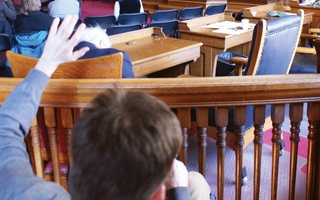Man has recovered his nerve, 2000 years after he lost it. Emmanuel G. Mesthene, a Harvard export on technology, told the delegates to the World Conference on Church and Society in Geneva Wednesday.
"We are ready to probe whatever our imagination prompts us to," he said. "We are convinced a gain, for the first time since the Greeks, of the essential intelligibility of the universe: there is nothing in it that is in principle not knowable."
Speaking to the 410 laymen and theologians who had assembled to tell the World Council of Churches, the churches should stand on major issues, Mesthene--director of he Program on Technology and Society--said that "technology has come of age" as a social phenomenon as well as technical capability.
"We are beginning to use invention as a deliberate way to deal with the future," he explained.
The churches, Mesthene said, will have to accept the feeling of confidence man gets from his new-found mastery of nature. "To see a sense of failure as a condition of religious experience is a historical relic dating from a time when an indifferent nature and a hostile world so over-whelmed men that they gave up thought for consolation."
The churches new role, he observed, will be to show the goodness and wisdom of God to men.
There was some grumbling among the delegates from Africa. Asia and Latin America about the relevance of the whole discussion of social problems accompanying advanced technology. "That is like talking to me about the problems of over-eating when I haven't got any food," one African objected. The impact of technology may be dehumanizing, but I don't think that's anything as bed as poverty."
The objection was one sign of the extent to which the conference is likely to be dominated by a discussion of the relations between rich and poor nations, a topic formally on the agenda.
The two-week conference, now in its fourth day, is the first ecumenical meeting of this kind at which most of the participants are laymen. It is also the first such meeting at which there are more delegates from Asia, Africa and Latin America than from North American and Western Europe.
Nearly half of the participants are from underdeveloped countries.
This is the third international conference on so big a scale for discussing Christian positions on issues that are normally considered secular. The first was held in Stockholm in 1925, the second at Oxford, England, in 1937.
The World Council of Churches, the sponsoring group, is an association of more than 200 Protestant, Anglican, Orthodox and Old Catholic churches in 30 countries. The Council has the broad aim of Christian unity.
Read more in News
Winthrop, Eliot Tie for Laurels In Intramural Wrestling MatchesRecommended Articles
-
Alum Helps Down Under NativesSYDNEY, Australia--The Australian bush is more than half a world away from the gates of Harvard Yard. For the continent's
-
 Climate Congress Has Three New Proposals
Climate Congress Has Three New Proposals -
Middle Eastern CEOs Discuss ChallengesA panel of three Middle Eastern CEOs discussed the opportunities and challenges of doing business in the Middle East at the Kennedy School last night before dozens of entrepreneurs from the Arab world as part of a week-long AllWorld Summit.
-
Delegate CountingWith no defining narrative emerging out of Tuesday’s Republican debate, the time is long past to start looking long and hard at the delegate math of this year’s primary.
-
Grad Student Council Election Draws Large Voter TurnoutAt the end of one of the longest and most contentious elections in recent memory, current President Cammi N. Valdez, along with a slate of other incumbent candidates, maintained control of five of the six contested positions on the Council.
-
Warren Secures Democratic Nomination for SenateIn a landslide victory of 95.7 percent of delegate votes, Elizabeth Warren secured the Democratic nomination for U.S. Senate at the Massachusetts Democratic Convention on Saturday. Her only competitor, Marisa DeFranco, failed to gather 15 percent of the 3,500 delegates to qualify as a candidate in September’s primary election.













